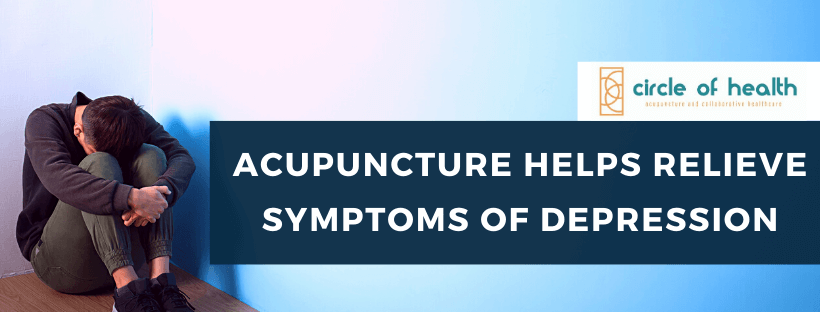Acupuncture for depression has increasingly become the subject of research studies both in the East and the West. While there's little consensus about whether acupuncture has an important place in the treatment of depression, it's also true that it's a really hard treatment to investigate empirically.
For this reason, most existing research is of low quality. In other words, it's really hard to know whether acupuncture has much of an effect on depression, beyond what we already know can be achieved from medication, therapy, or a combination of the two.
However, acupuncture continues to grow in popularity, particularly in the East, and so it deserves proper attention as a potential treatment for depression, especially for those for whom other methods have failed.
What Is Depression
As a quick summary, depression is an illness characterized by certain symptoms, and not just sadness or the blues. It involves a persistently depressed mood or loss of interest or pleasure accompanied by other symptoms, the most common listed below:
• Changes in weight and appetite
• Inability to concentrate
• Having negative thoughts and worrying about the future
• Feeling irritable, tired, or agitated
• Being unable to sleep or sleeping too much
• Feeling hopeless about the future
• Having thoughts of suicide
There’s no single cause of depression, according to research. Brain chemistry, hormones, genetics, life experiences and physical health can all play a role.
While depression is most commonly treated with medication, therapy, or a combination of the two, increasingly, complementary and alternative treatments are being used and sought out by persons with depression.
What Is Acupuncture?
Acupuncture is a technique based on traditional Chinese medicine that involves unblocking channels of energy (also known as Qi) that are thought to reside within the body.
Chinese medicine regards the mind and body as interacting together, such that what you feel in your mind can have a physical impact on your body.
Emotions are represented by five different elements as follows:
• Fear (Water)
• Anger (Wood)
• Happiness (Fire)
• Worry (Earth)
• Grief (Metal)
It's believed that these have an effect on internal organs, which are thought of as either "yin" or "yang." Each organ is thought to correspond to a certain emotion.
For example, the liver is thought to correspond to the emotion of anger. Having feelings of anger could cause trouble to your liver, and a blocked flow to your liver could also result in you feeling angry, according to Chinese Medicine and acupuncture.
In order to rid you of congestion, where energy gets stuck, acupuncture clears the meridians in your body to allow Qi to freely move about. This is accomplished in practice by inserting fine needles into certain points of your body, that are thought to correspond to the meridians and connect to your organs.
Possible Side Effects of Acupuncture
While the side effects of acupuncture are rare, it's important to realize that they do exist. Below are lists of both the mild and serious side effects that can result. Using only a certified professional for acupuncture reduces the risk of side effects.
Potential Mild Side Effects
The following side effects may be seen at the site where the needles were inserted:
• Itchiness
• Allergic reaction
• Feeling sore
• Bleeding or bruising
Rare Serious Side Effects
The following side effects are rare but possible:
• Nerve damage
• Infection
• Dizziness or fainting
This would generally result from improper administration of acupuncture and is why it is important to receive it from a trained professional.
How Acupuncture for Depression Is Practiced
How does acupuncture for depression work? The acupuncturist will insert needles into certain points of your body that are thought to connect to the negative emotions that you are having.
The needles are thought to fix blocked energy or imbalances in your body, which will also influence your mind. This process is something you would receive once a week or several times a week depending on your individual situation.
Below is a list of some of the points that might be used to relieve depression symptoms.
Each of these corresponds to a certain point on your body:
• Guanyuan (CV4): lower back
• Qihai (CV6): below the navel
• Zhongwan (CV12): over the middle of the stomach
• Hegu (L14): on the hand
• Master of Heart 6 (MH6): underside of wrist
• Yanglingquan (GB34): on the leg
• Zusanli (ST36): below the knee
• Taixi (K13): on the ankle
• Shugu (BL65):
So, after your acupuncturist has inserted needles in the identified locations, you would lie still on a table in a peaceful setting, such as with music playing, aromatherapy, and mood lighting.
It's not hard to imagine that this might make you feel better, regardless of whether acupuncture actually treats depression. In fact, the state after receiving acupuncture has been referred to as "acubliss."
Research on Acupuncture for Depression
While there are numerous studies on the effectiveness of acupuncture for depression, the quality of these studies sometimes comes into question.
This isn't because researchers don't want to properly investigate acupuncture, but rather that it's really hard to set up a proper study to test this treatment without some sort of bias getting in the way.
Below are some of the potential sources of bias and why they may be a problem for acupuncture in particular.
• Difficulty creating an adequate control condition (i.e., it's hard to fake acupuncture)
• Difficulty blinding patients and practitioners (i.e., the acupuncturist will know if they are doing the treatment or not)
• The problem of reporting bias (i.e., studies in the east are more likely to show positive findings than studies in the West)
• The problem that acupuncture has a strong placebo effect (so any real smaller effect may be hard to detect)
So, what constitutes a strong research study on acupuncture for depression? It should have the following qualities:
• Include an adequate control group
• Account for the placebo effect
• Take into account blinding
• Replicate results across different locations
Acupuncture for Depression Research: A Review Study
Rather than consider the results of individual studies, here we will take a look at the findings of one large review study that included 64 studies and 7104 participants.
What that study showed was that most of the studies included in the review were at risk for various kinds of bias (e.g., detection bias, selection bias, reporting bias, etc.)
However, there was low-quality evidence suggesting that acupuncture could moderately reduce the severity of depression compared to no treatment, waitlist, or treatment as usual.
When compared with sham acupuncture, it was shown that there was a small reduction in the severity of depression. This suggests that acupuncture may have more of an effect beyond just as a placebo for depression.
Compared to medication, there was low-quality evidence of a small benefit, which varied by type of medication and the mode of acupuncture (regular vs. electro).
Finally, when compared with psychological therapy, the results were unclear. No conclusions could be drawn about evidence of an effect beyond that observed for psychological therapy for depression.
In addition, few of the studies conducted follow-ups or studied other variables such as quality of life, which are important in depression research.
Western Research on Acupuncture and Stress
Meanwhile, there does seem to be evidence of the effectiveness of acupuncture in terms of blocking stress hormones and the stress response. This may be because the needles activate natural painkillers in the brain in the form of endorphins.
Is Acupuncture for Depression Right for Me?
Are you still not sure whether acupuncture for depression is right for you? Here are some factors to consider:
• Can you afford it or will the cost of it be covered by a health plan for you?
• Do you have time to attend sessions on a regular basis?
• Are you open to the experience and willing to accept potential side effects from it?
• Is there a certified professional that you can receive it from? If you aren't sure where to look, consider asking for a referral from your doctor or from certifying agencies such as the National Certification Commission for Acupuncture and Oriental Medicine (NCCAOM).
• Have you exhausted other traditional avenues of treatment for depression or are you looking for something to complement other treatments?
• Have you spoken to your doctor about your desire to receive acupuncture?
Based on your answers to these questions, you should develop a better understanding as to whether it is right for you.
Acupuncture for depression is an alternative therapy that has received only modest research support. This healing therapy based on ancient Chinese Medicine appears to show a small benefit for those with depression. If you are considering receiving this treatment, be sure that you contact a registered professional with proper training.
Article Source: Understanding Acupuncture for Depression
Author: Arlin Cuncic | Medically Reviewed: Steven Gans, MD
If you or a loved one are struggling with depression, contact the Substance Abuse and Mental Health Services Administration (SAMHSA) National Helpline at 1-800-662-4357 for information on support and treatment facilities in your area.
Learn More About Acupuncture
Visit: https://circleofhealthlongmont.com/therapy/acupuncture.php
Schedule Your Acupuncture Appointment Online: https://circleofhealthlongmont.as.me

Garth Reynolds, MSTCM, L.Ac.
Licensed Acupuncturist and Clinical Herbalist | Schedule Your Appointment
Martial Arts Instructors with Bagua Internal Arts | Local & Online Classes Weekly
#Acupuncture #AcupunctureBenefits #AcupunctureNearMe #AcupunctureWorks #Depression #DepressionRelief #AcupunctureForDepression #AcupunctureforMentalHealth #NaturalDepressionRelief


